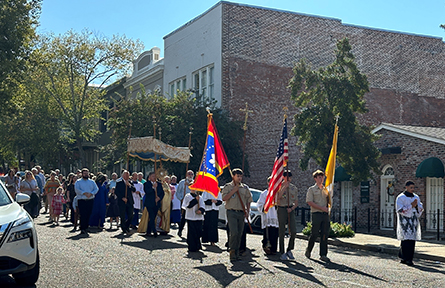
FEATURE PHOTO … Eucharistic Procession …


By Marietha Góngora V. , OSV News
WASHINGTON (OSV News) – En la noche del pasado 16 de octubre en la nunciatura de la Santa Sede en Washington D.C., el Comité de Diversidad Cultural en la Iglesia de la Conferencia de Obispos Católicos de los Estados Unidos (USCCB) y el Subcomité de Asuntos Hispanos, en cabeza de su presidente el Mons. Oscar Cantú, obispo de San José; convocaron a líderes de organizaciones católicas y líderes de la pastoral hispana de las diferentes diócesis del país.
Esta jornada, en el marco del cierre del Mes de la Herencia Hispana, se llevó a cabo en medio de un ambiente festivo en el que el cardenal Christophe Pierre, nuncio apostólico de la Santa Sede en EE.UU., compartió una serie de experiencias y reflexiones de cara a esta celebración.
“Yo pienso que, en la pastoral hispana, en todos ustedes, siempre he encontrado algo especial. Yo he vivido 20 años de mi vida también en América Latina, en México y también en Cuba”, dijo en sus palabras de bienvenida el nuncio apostólico.
“Si hay algo que siempre me ha impresionado y que pienso que es algo que ustedes nunca deben perder es el entusiasmo para la misión”, expresó. “Eso ciertamente es parte de su ADN”.
Afirmando que, durante sus casi nueve años como nuncio en EE.UU., él mismo ha percibido un deseo de vivir la fe como misión, el cardenal Pierre dijo que no hay que perder la “experiencia misionera como miembros de la Iglesia a través de movimientos, a través de una formación” que muchos de los presentes habían experimentado.
Para el cardenal, el dinamismo propio de los fieles hispanos no se puede perder. “Hay que continuar ofreciendo (ese dinamismo) a la Iglesia de este país. Esa puede ser su contribución, la misión”, afirmó.
“El dinamismo, el método, la capacidad de preparar el V Encuentro. Eso fue muy bueno”, dijo el nuncio, con relación al proceso de muchos años del V Encuentro Nacional de Pastoral Hispana/Latina (V Encuentro) que incluyó una reunión nacional en Grapevine, Texas, en 2018, y cuyas conclusiones siguen dando frutos.
El nuncio subrayó que los líderes estaban también reunidos “para, finalmente, poner en práctica el Plan Pastoral (Nacional para el Ministerio Hispano/Latino)” que busca multiplicar las respuestas pastorales para hacer frente a las realidades de los hispanos católicos en EE.UU.
“El plan pastoral es un plan sinodal, ha sido un camino sinodal. Hemos caminado por meses, y meses, y meses para poder producir algo que corresponde a las necesidades de la cultura de hoy para poder evangelizar esta cultura, evangelizar a la gente”, destacó el nuncio, refiriéndose al plan de 10 años que fue aprobado por los obispos en 2023.
El cardenal instó a los presentes a no olvidar que “hay 65 millones de hispanos en este país, todos de origen católico, pero viven un cambio cultural tremendo”.
Según la Oficina del Censo del país, hoy en día hay más de 65 millones de hispanos que viven en EE.UU. El año pasado, un análisis de datos de Pew Research Center identificó que el número de Latinos sin afiliación religiosa ha aumentado, mientras que el porcentaje de Latinos que se identifican como católicos ahora representa un 43% de la población hispana.
El nuncio recordó que en la Conferencia de Aparecida del 2007, celebrada por CELAM en Brasil, “los obispos (de Latinoamérica y el Caribe) identificaron uno de los datos muy importantes del cambio de época, como lo dijeron ellos, fue la dificultad de transmitir la fe, la cultura de una generación a otra. Que no es solamente un cambio cultural de una generación a otra, es algo más profundo”.
El mundo ha cambiado, continuó el cardenal Pierre, agregando que innovar “es salir de nosotros mismos para (ir al) encuentro de las personas y entrar precisamente, provocar un nuevo encuentro que va a producir frutos nuevos. Eso es la cultura del encuentro. Esa es la nueva evangelización”, afirmó el representante de la Santa Sede.
Durante el encuentro, el nuncio destacó y agradeció la presencia de monseñor Bruce A. Lewandowski, C.Ss.R., obispo auxiliar de la Arquidiócesis de Baltimore; monseñor Evelio Menjivar-Ayala, obispo auxiliar de la Arquidiócesis de Washington; monseñor Cristiano G. Borro Barbosa, obispo auxiliar de la Arquidiócesis de Boston y monseñor Luís Miguel Romero Fernández, M.Id, obispo auxiliar de la Diócesis de Rockville Centre en Nueva York.
Dirigiéndose a los líderes de organizaciones católicas y líderes de la pastoral hispana presentes en el evento, el cardenal Pierre dijo que se sentía “muy feliz de ver que cada uno de ustedes tiene responsabilidad en la Iglesia. Responsabilidad a nivel nacional, movimientos, grupos que también vienen de todos los lugares, del norte, del sur, del este, del oeste”, concluyó.
Por su parte, el obispo Oscar Cantú reflexionó sobre la presencia hispana/latina y los hallazgos fruto de los recientes estudios liderados por el equipo de esta secretaría y sobre la importancia de la inculturación en los procesos de la evangelización, tomando como ejemplo las apariciones de Nuestra Señora de Guadalupe en 1531.
“Cuando los frailes tuvieron poco éxito en la evangelización, por más de 10 años, envió Dios a una mujer, a Su madre, a evangelizar. ¿Cuál fue la metodología que usó? Inculturó el mensaje del Evangelio a la cultura de ese momento y comenzó desde abajo, con los humildes, con un Juan Diego”, dijo el obispo Cantú.
El prelado recordó la iniciativa del Consejo Episcopal Latinoamericano y Caribeño (CELAM), de la Conferencia del Episcopado Mexicano y la Pontificia Comisión para América Latina de celebrar los 500 años de estas apariciones de la Patrona de las Américas con una novena intercontinental que inició el 12 de diciembre de 2022 y que finaliza justo el día en que se cumplen los cinco siglos de la llegada de la Virgen de Guadalupe al nuevo mundo.
Para el obispo Cantú, esta es una oportunidad para “fortalecer nuestra fe, nuestra devoción, nuestra Iglesia y nuestro poblado hispano. Qué bonito que podemos celebrar este mes de la hispanidad aquí, en la nunciatura, con estos anuncios. Entonces, les invito a todos ustedes, líderes de muchas personas, (a) fomentar esa invitación a vivir esta Novena Guadalupana”.
Por su parte, Alejandro Aguilera-Titus, subdirector de Asuntos Hispanos del Secretariado de Diversidad Cultural en la Iglesia, dijo a OSV News, concluida la jornada, que notó que los asistentes se encontraban “con un corazón agradecido, abierto e inspirado. Nosotros esperábamos treinta personas y vinieron sesenta, veintiocho tuvieron que volar para llegar acá y muestra el cariño y el deseo que tienen de celebrar, de demostrar su aprecio, de seguir comunicándose con sus colegas a nivel del liderazgo nacional”.
“Fue maravilloso ver el nivel de interés que expresaron, el entusiasmo que hay y también querían saber cómo es que se está implementando el Plan Pastoral”, aseguró Aguilera-Titus en relación a un video que documentó cómo cuatro diócesis avanzan exitosamente en el proceso de implementación, material que pronto será publicado.
OSV, compañía católica que ha apoyado los esfuerzos del V Encuentro, está apoyando la creación de dicho recurso, y también fue “host” del evento del 16 de octubre. (OSV es la empresa matriz de OSV News y de la revista Our Sunday Visitor).
(Marietha Góngora escribe para OSV News desde Washington D.C.)
Por Cindy Wooden
CIUDAD DEL VATICANO (CNS) – Las parroquias y las diócesis deben actuar rápidamente para dar vida a los órganos consultivos y a una amplia participación en la misión y el ministerio ya previstos por la ley eclesiástica si la Iglesia Católica ha de tener alguna esperanza de convertirse en una Iglesia más “sinodal”, dijeron los miembros del Sínodo de los Obispos.
“Sin cambios concretos, la visión de una Iglesia sinodal no será creíble y alejará a los miembros del Pueblo de Dios que han recibido aliento y esperanza del camino sinodal”, dijeron los miembros en el documento final que aprobaron el 26 de octubre.
El Papa Francisco convocó el sínodo en 2021, pidiendo a parroquias, diócesis y conferencias episcopales que celebraran sesiones de escucha antes de la primera asamblea sinodal en Roma en 2023. La segunda asamblea que tuvo lugar este año e incluye a la mayoría de los mismos miembros, comenzó con una Misa en el Vaticano el 2 de octubre.
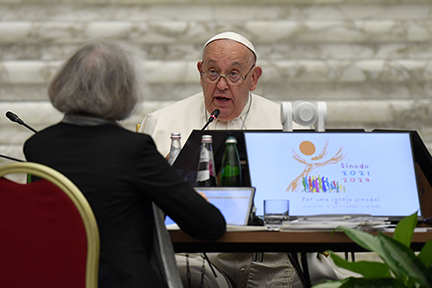
Los miembros votaron sobre cada uno de los 155 párrafos del documento, en el que se hacían sugerencias y solicitudes al Papa Francisco que incluían proyectos a largo plazo, como continuar el discernimiento sobre la posibilidad de mujeres diáconos, la necesidad de reformar la formación en los seminarios y la esperanza de que más laicos participen en la selección de obispos.
Pero también incluían acciones que podrían y deberían ponerse en práctica inmediatamente, como contratar a más mujeres y laicos para enseñar en los seminarios o hacer que los obispos hagan obligatorios los consejos pastorales en todas las parroquias y que los párrocos se aseguren de que esos órganos sean realmente representativos de los miembros de la parroquia y de que él escucha sus consejos.
Los funcionarios del Sínodo afirmaron que todos los párrafos fueron aprobados por los dos tercios necesarios de los miembros del Sínodo presentes y votantes; 355 miembros estuvieron presentes y votaron, por lo que la aprobación requirió 237 votos. Un párrafo dedicado a aumentar el perfil de la mujer en la Iglesia recibió, con diferencia, el mayor número de votos negativos de todos los párrafos, con 97 miembros que votaron no y 258 que votaron sí. El apartado, que requería el 66 % de los votos, fue aprobado con el 72 %.
“En términos simples y concisos”, dijeron los miembros, “la sinodalidad es un camino de renovación espiritual y de reforma estructural para hacer la Iglesia más participativa y misionera, es decir, para hacerla más capaz de caminar con cada hombre y mujer irradiando la luz de Cristo”.
En una Iglesia sinodal, decía el documento, los miembros tienen funciones diferentes, pero trabajan juntos por el bien de todos los miembros y por la misión de la Iglesia.
Al igual que el informe de síntesis de la primera asamblea del sínodo de 2023, el documento final no utilizaba el término “LGBTQ” ni siquiera “homosexualidad” y sólo hablaba brevemente de la necesidad de llegar a las personas que “experimentan el dolor de sentirse excluidas o juzgadas a causa de su situación matrimonial, identidad o sexualidad”.
El documento se refería repetidamente a la “igual dignidad” de los hombres y las mujeres en virtud de su bautismo e insistía en que la Iglesia Católica necesitaba hacer más para reconocer las contribuciones de las mujeres a la vida y misión de la Iglesia y su potencial para ofrecer más.
“Las mujeres siguen encontrando obstáculos para obtener un reconocimiento más pleno de sus carismas, de su vocación y de sus funciones en los diversos ámbitos de la vida de la Iglesia”, afirmó. “Esto va en detrimento del servicio a la misión compartida de la Iglesia”.
Los miembros del sínodo pidieron la “plena aplicación de todas las oportunidades ya previstas en la legislación vigente en relación con el papel de la mujer”, y afirmaron que “no hay nada en las mujeres que les impida desempeñar funciones de liderazgo en las Iglesias: lo que viene del Espíritu Santo no debe detenerse”.
“Sigue abierta la cuestión del acceso de las mujeres al ministerio diaconal”, dijeron. “Este discernimiento debe continuar”.
La pregunta sobre el diaconado femenino fue uno de los temas que el Papa Francisco asignó a los grupos de estudio la primavera pasada. Los miembros del Sínodo pidieron a la Secretaría General del Sínodo que siga velando por la calidad sinodal del método de trabajo de los grupos de estudio, que deben informar al Papa en junio de los temas en los que se han enfocado.
El proceso sinodal, decían los miembros, era una “llamada a la alegría y a la renovación del Pueblo de Dios en el seguimiento del Señor y en el compromiso al servicio de su misión y en la búsqueda de caminos de fidelidad”.
Pero el documento reconocía repetidamente el crimen y el pecado del abuso sexual clerical y del abuso de poder, e insistía en que el compromiso con la sinodalidad – en particular con aprender a escuchar y con las formas necesarias de transparencia y responsabilidad – eran esenciales para prevenir los abusos.
La sinodalidad, dijeron los miembros, “ayudará a superar el clericalismo entendido como el uso del poder en beneficio propio y la distorsión de la autoridad de la Iglesia que está al servicio del Pueblo de Dios. Esto se expresa especialmente en los abusos sexuales, económicos, de conciencia y de poder por parte de los ministros de la Iglesia”.
Las mujeres y los hombres laicos tienen muchos talentos que pueden y deben ayudar a los obispos y párrocos en el buen funcionamiento de sus diócesis o parroquias, expresaron los miembros del Sínodo. Aprovechar esos talentos puede ayudar a obispos y a sacerdotes, quienes a menudo se sienten sobrecargados de trabajo.
Cuando las leyes de la Iglesia exijan a los obispos que consulten a su consejo sacerdotal o pastoral, o a los párrocos que consulten al consejo parroquial, decía el documento, “no pueden proceder como si no hubiera tenido lugar”.
“Como en cualquier comunidad que vive según la justicia”, decía, “el ejercicio de la autoridad no consiste en la imposición arbitraria de una voluntad”.
Los miembros del Sínodo también dijeron que escuchar, consultar, orar y discernir antes de tomar una decisión no es el final del proceso. “Debe ir acompañado y seguido de prácticas de rendición de cuentas y evaluación en un espíritu de transparencia inspirado en criterios evangélicos”.
Garantizar la rendición de cuentas y la evaluación periódica del desempeño de todos los que ejercen el ministerio en nombre de la Iglesia “no es una tarea burocrática porque sí. Es más bien un esfuerzo comunicativo que se revela como una poderosa herramienta educativa para provocar un cambio en la cultura”, afirmaron los miembros del sínodo.
Un tema que suscitó debate durante el sínodo fue el de la autoridad de las conferencias episcopales nacionales, sobre todo en temas doctrinales.
Los miembros del Sínodo, en el documento final, pidieron que se estudiara el estatuto teológico y jurídico de las conferencias episcopales y que se definiera con claridad “el ámbito de la competencia doctrinal y disciplinar” de dichas conferencias.
Por David Agren
CIUDAD DE MÉXICO (OSV News) – El padre Marcelo Pérez, un defensor de los pueblos indígenas que dedicó su vida a la promoción de la paz quien fue asesinado hace unos días, fue enterrado en su tierra natal en medio de indignación y reclamos de justicia.
El padre Pérez, sacerdote de origen tzotzil de la Diócesis de San Cristóbal de las Casas, fue recordado por proteger a los pobres y desposeídos, al tiempo que buscaba el diálogo cuando era posible y denunciaba siempre la injusticia en una región cada vez más violenta.
“El padre Marcelo cuidaba especialmente de los más pobres, de los más débiles, de los más desprotegidos y los cuidaba de la gente abusiva, de la gente poderosa, de la gente que se siente dueña de la sociedad y de la tierra y que no me importa dañar la vida del prójimo para enriquecerse o para adquirir mayor poder político para adquirir todo lo que ellos quieren”, dijo el obispo emérito de Saltillo, José Raúl Vera López, durante una emotiva Misa al aire libre a la que asistieron cientos de pobladores en San Andrés Larrainzar.
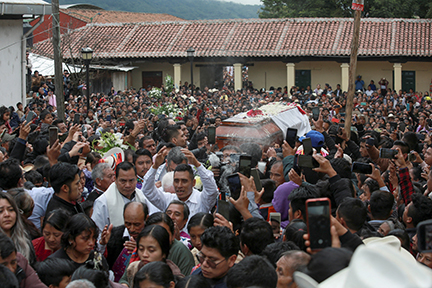
“Él se preocupó especialmente de las personas que eran dañadas en su dignidad, en el trato injusto de parte de autoridades o de parte de personas abusivas. Esto, queridas hermanas y queridos Hermanos Es lo que nos dice hoy el Señor Jesucristo”, dijo monseñor Vera, quien era obispo coadjutor en San Cristóbal de las Casas cuando el padre Pérez ingresó al seminario menor.
“Esta es la razón por la que él murió con su palabra de profeta, que es Palabra de Dios”.
Los dolientes en su entierro gritaban: “¡Viva el padre Marcelo!” y “Marcelo, amigo, el pueblo está contigo”.
Pero el impacto de la muerte del padre Pérez golpeó duramente a los habitantes de Chiapas y suscitó la condena generalizada de los católicos de todo el país, así como de muchos miembros de la sociedad mexicana. El padre Pérez había sufrido amenazas e intentos de asesinato por su labor como mediador en conflictos, atendiendo a víctimas de la violencia y enfrentándose a jefes políticos y grupos criminales.
Su asesinato se produjo en una época en que el estado mexicano de Chiapas – el cual ha sido asolado por la pobreza, la desigualdad y la discriminación de los grupos indígenas durante mucho tiempo – se convulsionó por la violencia de los cárteles de la droga, que han hecho huir a cientos de personas a la vecina Guatemala.
El padre Pérez fue asesinado a tiros tras celebrar Misa en San Cristóbal de las Casas el 20 de octubre. Las imágenes de las cámaras de seguridad mostraron al sacerdote saliendo de la iglesia, subiendo a su coche y siendo asesinado a balazos a través de la ventana por un agresor que huyó del lugar.
El gobernador de Chiapas, Rutilio Escandón, anunció el 22 de octubre que se había detenido a un sospechoso. La presidenta Claudia Sheinbaum anunció ese mismo día que la fiscalía federal investigaría el crimen.
Sheibaum, quien asumió el cargo el 1 de octubre, aprovechó su conferencia de prensa matutina del 22 de octubre para destacar la encuesta de “percepción social de Inseguridad” del Instituto Nacional de Estadística y Geografía (INEGI), que mostró una mejor situación de seguridad.
“En el país la gente se siente más segura que en el 2018” – cuando su predecesor y mentor, el presidente Andrés Manuel López Obrador asumió el cargo – e incluso más “que en el 2013”, dijo.
Con referencia a la situación en Chiapas, ella dijo que “es importante trabajar para que no vuelva a ocurrir una situación así y que no haya desplazamientos y pacificar, y evitar extorsiones y delitos que se están presentando”.
La reacción de la presidente reflejó una tendencia del partido gobernante, Morena, a restar importancia a la violencia, incluso cuando ésta se extiende a zonas del país antes consideradas como plácidas.
El padre Pérez, sin embargo, se pronunció sobre la violencia en Chiapas a lo largo de su sacerdocio – y especialmente cuando la violencia se intensificó en ese lugar.
Le dijo a los periodistas que cubrían una marcha por la paz convocada el 13 de septiembre por las tres diócesis católicas de Chiapas que, en muchas comunidades y municipios, la violencia es realmente insoportable.
El padre Pérez nació en San Andrés Larrainzar, un pueblo indígena tzotzil (tsotsil) conocido por los Acuerdos de San Andrés firmados en 1996 por el Ejército Zapatista de Liberación Nacional y el gobierno mexicano tras un levantamiento de los zapatistas por los derechos indígenas.
Ingresó en el seminario menor siendo adolescente y fue ordenado sacerdote en 2002. Era un sacerdote indígena poco frecuente en una diócesis con más de 400 diáconos indígenas casados, que fueron ordenados por el obispo Samuel Ruiz García – que promovió una iglesia autóctona en Chiapas – para atender mejor a comunidades remotas sin sacerdotes.
El padre Pérez sirvió al principio de su sacerdocio en el municipio de Chenalhó, escenario en 1997 de una tristemente célebre masacre en Acteal de un grupo católico pacifista conocido como Las Abejas, que se cobró 45 vidas. Pero después de ocho años en la dividida comunidad, logró la participación comunitaria “sin diferencia de ideología o de postura política en las asambleas litúrgicas y en la forma de formación”, dijo a OSV News el padre jesuita Pedro Arriaga.
Más tarde trabajó para encontrar la paz durante su siguiente asignación en Pantelhó, donde un grupo armado se sublevó contra un “strongman” local, lo que llevó a que se emitiera una orden de arresto en su contra.
Siempre luchó por la paz, pero no sin riesgos. Unos presuntos asesinos manipularon el sistema eléctrico de su coche para que explotara, pero no funcionó, según el padre Arriaga. En otra ocasión le aflojaron las ruedas. Le instaron a abandonar la diócesis, pero el padre Pérez se negó a huir.
“Había amenazas por tanto tiempo”, dijo el padre Arriaga, antiguo portavoz diocesano en San Cristóbal de las Casas.
Recordó al padre Pérez como “un profeta”, describiéndolo como “siempre del lado de los pobres. Muy radical y sin tener miedo a hacer declaraciones a la prensa”.
“Él consideraba la muerte como una posibilidad por estar denunciando esta situación”.
(David Agren escribe para OSV News desde la Ciudad de México.)
Por Obispo Joseph R. Kopacz, D.D.
Después de tres años de reflexión, el Sínodo sobre la Sinodalidad llegó a su fin en la noche del 26 de octubre de 2024, cuando los 356 miembros de la asamblea se reunieron para votar el documento final. En un acto inesperado, el papa Francisco aprobó inmediatamente este documento, diciendo que no publicaría una exhortación apostólica postsinodal, que es el tipo de documento papal que suele seguir a un sínodo. Por lo tanto, este texto entra inmediatamente dentro del magisterio del Papa. Sin embargo, especificó que no era normativo. Sin embargo, ha sido un proceso pastoral notable que ha reunido a fieles de todo el mundo en estos últimos tres años.

Guiadas por el Espíritu Santo, las conversaciones comenzaron en la iglesia diocesana local y progresaron hasta producir documentos regionales y continentales. Los casi 400 delegados que se reunieron en Roma durante el mes de octubre del año pasado y este año, representando a nuestra Iglesia Una, Santa, Católica y Apostólica y pudieron desarrollar las voces de los fieles católicos de todo el mundo.
Por el momento, el documento sinodal está en italiano, pero el progreso de la traducción está girando para difundirlo a lo grande. No es sorprendente que el documento no marque el comienzo de una nueva era de enseñanza eclesiástica, como algunos estaban ansiosos. Pero la singularidad de este Sínodo se encuentra en las reuniones deliberativas y consultivas de los líderes de la iglesia que incluyeron a los ordenados, profesos y laicos desde su inicio en 2021.
Estos encuentros sustantivos han sacado a la luz los temas de la comunión, de la participación y de la misión, con tiempo suficiente para mirar larga y amorosamente la realidad con el fin de ver, juzgar y actuar mejor. Esta ampliación del el Cuerpo de Cristo representaba nuestra universalidad. Las fotos de los delegados reunidos en Roma retrataron esta visión, cuyo arduo trabajo culminó en el documento final. Sin embargo, los procesos deliberativos y consultivos no pueden limitarse a procesos extraordinarios como el Sínodo sobre la sinodalidad, sino que deben integrarse en la vida de la Iglesia a todos los niveles y en todo lugar. La ampliación de nuestra visión, sentido de misión y alcance de los ministerios impregna el trabajo de los delegados, y el impacto de sus labores bajo la mirada e inspiración del Espíritu Santo será desentrañado, reflexionado y puesto en práctica en los próximos años.
A lo largo del documento hay un llamado repetido a la unidad en el Cuerpo de Cristo, y a un compromiso renovado con la misión como discípulos alegres del Señor crucificado y resucitado. El domingo 27 de octubre, el Papa presidió la misa final del sínodo en la Basílica de San Pedro. Rodeado de los delegados mundiales de la cumbre, el Papa Francisco animó a la Iglesia a ser atentos a “los desafíos de nuestro tiempo, la urgencia de la evangelización y las muchas heridas que afligen a la humanidad”.
“Una Iglesia sedentaria, que se retira inadvertidamente de la vida y se confina a los márgenes de la realidad, es una Iglesia que corre el riesgo de permanecer ciega y sentirse cómoda con su propio malestar”, dijo el Papa. “Si nos quedamos atrapados en nuestra ceguera, no lograremos comprender continuamente la urgencia de dar una respuesta pastoral a los muchos problemas de nuestro mundo”.
Al poner fin oficialmente al proceso sinodal de tres años, el Papa Francisco declaró que ahora es el momento de que como Iglesia “pongamos manos a la obra” y “llevemos la alegría del Evangelio por las calles del mundo”.
Los últimos tres años de sinodalidad mundial son un faro de luz a medida que nos embarcamos en el Año Jubilar de la Esperanza que comenzará durante la temporada navideña y continuará a lo largo de 2025. La alegría del Evangelio es nuestro don al mundo que clama con dolor por la unidad y la paz.
(Nota del editor: Al cierre de esta edición, el 1 de noviembre de 2024, el documento final de la XVI Asamblea del Sínodo de los Obispos solo estaba disponible en el original italiano. Visite https://www.synod.va/en.html en los próximos días para obtener traducciones de idiomas adicionales).
By Carol Glatz
CIUDAD DEL VATICANO (CNS) – Los migrantes demuestran lo que es la esperanza, y la Iglesia católica debe apoyarlos para mantener viva esa esperanza, dijo el Papa Francisco.
“Si queremos que no se pierdan en ellos la fuerza y la resiliencia necesarias para proseguir su viaje, hace falta alguien que se rebaje hasta sus heridas, que se ocupe de su extrema vulnerabilidad física, también (de su) vulnerabilidad espiritual y psicológica”, dijo el Papa a los miembros de los misioneros Scalabrinianos durante una audiencia en el Vaticano el 28 de octubre.
“Se necesitan sólidas intervenciones pastorales de proximidad, a nivel material, religioso y humano, para sostener en ellos la esperanza, y con ella los caminos interiores que conducen a Dios, fiel compañero de viaje”, dijo.
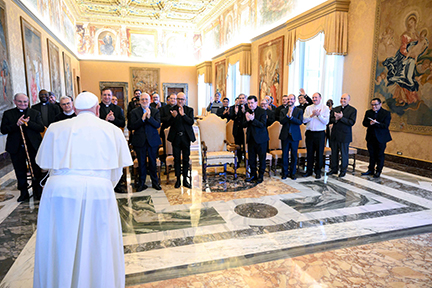
El Papa lamentó “la cerrazón y la hostilidad de los países ricos, que ven en los que llaman a la puerta una amenaza para su propio bienestar”.
“Incluso hoy en día, los que se marchan a menudo lo hacen por las trágicas e injustas desigualdades de oportunidades, de democracia, de futuro, o por los devastadores escenarios bélicos que asolan el planeta”, dijo. Este problema se ve agravado por el cierre de fronteras y la hostilidad mostrada por las naciones más adineradas.
En este “dramático enfrentamiento entre los intereses de quienes protegen su prosperidad y la lucha de quienes tratan de sobrevivir, huyendo del hambre y la persecución, se pierden tantas vidas, ante la mirada indiferente de quienes se limitan a contemplar el espectáculo, o peor aún, a especular con la piel de los que sufren”, dijo, condenando el “escándalo” de los cultivadores de manzanas del norte de Italia que acogen a migrantes del centro de Europa para echarlos una vez terminada la cosecha.
La congregación, fundada por San Juan Bautista Scalabrini en 1887, es una comunidad internacional de religiosos al servicio de migrantes y refugiados de diferentes culturas, religiones y etnias en 35 países y en los cinco continentes. Durante el capítulo general de la congregación, el padre scalabriniano Leonir Chiarello fue reelegido a mediados de octubre para otro mandato de seis años como superior general.
El Papa Francisco elogió a la congregación por su trabajo y carisma, diciendo que pensaba en ellos cuando decidió elevar al Colegio Cardenalicio al padre scalabriniano Fabio Baggio, subsecretario y jefe de la sección para migrantes y refugiados en el Dicasterio para el Servicio del Desarrollo Humano Integral.
El Papa quiso hacerlo antes, “pero él no quería”, dijo el pontífice. Pero “por obediencia”, el misionero italiano será nombrado cardenal en un consistorio el 7 de diciembre.
“Tómenlo como un gesto de estima, de gran estima”, dijo el Papa Francisco.
Los emigrantes “son maestros de esperanza”, dijo, destacando cómo siendo hijo de inmigrantes italianos en Argentina, su familia siempre sintió que ir a “América” era una forma de prosperar y tener una vida mejor.
“A menudo sostenida por el amor a las familias que dejan atrás”, dijo, la determinación de los que emigran “nos enseña tanto”. La migración puede ser un momento de crecimiento para todos, “con un apoyo adecuado”.
Los migrantes deben ser acogidos, acompañados, apoyados e integrados en las comunidades de acogida, afirmó.
Independientemente de quiénes sean o de dónde vengan, todos los migrantes deben ser vistos como “un don de Dios, único, sagrado, inviolable, precioso para el bien de todos”, dijo.
NACIÓN
NUEVA YORK (OSV News) – Varias organizaciones están invitando a los fieles a rezar por los cristianos perseguidos durante todo el mes de noviembre, ya que más de 365 millones de creyentes en Cristo en todo el mundo sufren altos niveles de persecución y discriminación, según un informe de 2024 del grupo de defensa Open Doors. El primer y segundo domingo de noviembre (3 y 10 de noviembre) han sido designados como un Día Internacional de Oración por la Iglesia Perseguida, una conmemoración organizada hace unas dos décadas por la Alianza Evangélica Mundial, con sede en Nueva York. Las dos fechas están diseñadas para dar a las comunidades religiosas flexibilidad y comodidad a la hora de observar la ocasión, según el sitio web dedicado a la iniciativa, idop.org. Puertas Abiertas, que proporciona Biblias y apoyo a cristianos perseguidos en más de 70 países, señala que 1 de cada 5 cristianos en África y 2 de cada 5 en Asia sufren persecución. Sólo en el último año, el número de creyentes perseguidos ha aumentado en unos 5 millones, según la organización. El 20 de noviembre, Ayuda a la Iglesia Necesitada – conocida como ACN, es una fundación promovida por el Papa que proporciona ayuda pastoral y humanitaria a los cristianos perseguidos – conmemorará el Miércoles Rojo, establecido por ACN en 2016 para concienciar sobre la persecución cristiana en todo el mundo. En honor a este día, se anima a las parroquias, escuelas y participantes individuales a vestirse de rojo, que recuerda la sangre de los mártires.
VATICANO
CIUDAD DEL VATICANO (CNS) – Dos días después de abrir la Puerta Santa de la Basílica de San Pedro para inaugurar el Año Santo 2025, el Papa Francisco irá a una prisión de Roma para abrir una Puerta Santa como “signo tangible del mensaje de esperanza” para las personas en las cárceles de todo el mundo, anunció el Vaticano. El Papa acudirá el 26 de diciembre a la prisión de Rebibbia, en las afueras de Roma, “símbolo de todas las prisiones dispersas por el mundo”, para transmitir un mensaje de esperanza a los presos, anunció el 28 de octubre en rueda de prensa el arzobispo Rino Fisichella, pro-prefecto de la sección para la nueva evangelización del Dicasterio para la Evangelización y principal organizador del Año Santo 2025. El Papa Francisco abrirá la Puerta Santa de la Basílica de San Pedro el 24 de diciembre. A continuación, abrirá las Puertas Santas de las basílicas mayores de San Juan de Letrán el 29 de diciembre, Santa María la Mayor el 1 de enero y San Pablo Extramuros el 5 de enero.
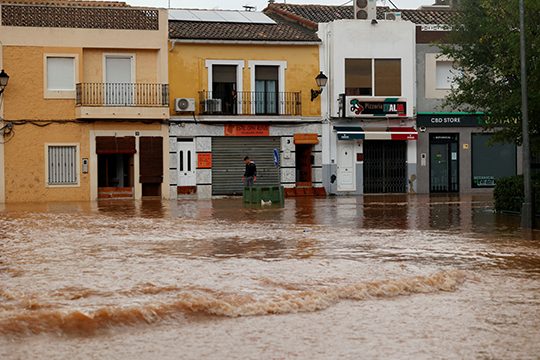
MUNDO
VALENCIA, España (OSV News) – El arzobispo de Valencia expresó su «grave preocupación» y celebró una misa por los afectados después de que al menos 72 personas murieran y muchas más desaparecieran a causa de las lluvias torrenciales que provocaron inundaciones masivas en el sureste de España. Las inundaciones convirtieron las carreteras en ríos de coches flotantes y cortaron autopistas y accesos, llegando el agua hasta el primer piso de los edificios. El arzobispo Enrique Benavent declaró el 30 de octubre que «espera que las víctimas y los desaparecidos sean encontrados sanos y salvos lo antes posible», según el medio católico español Alfa y Omega. El arzobispo celebró una misa por todos los afectados la mañana del 30 de octubre en una basílica local. En una carta enviada al arzobispo Benavent y a monseñor Julián Ros, administrador apostólico de la diócesis de Albacete, al oeste de Valencia, los obispos españoles dicen que comparten «su dolor por los difíciles momentos que están viviendo en sus diócesis». Las terribles inundaciones que dejaron montones de coches atascados entre los edificios de las históricas y estrechas calles de Valencia y atraparon a decenas de residentes fueron causadas por la tormenta Dana, calificada de «fenómeno sin precedentes» por la ministra de Defensa española, Margarita Robles. El Rey Felipe VI manifestó su «consternación y preocupación» por las inundaciones repentinas. Hablando de la «enorme destrucción» del 30 de octubre, dijo que el acceso a algunas zonas seguía siendo difícil. España declaró tres días de luto tras las inundaciones repentinas que devastaron parte del país.
Vírgenes y Santos
San Martín de Tour. Noviembre 11
Santa Francisca Javiera Cabrini.
Noviembre 13
Presentatión de la Bienaventurada Virgen María. Noviembre 21
Día de Acción de Gracias. Noviembre 28
San Andrés, Apóstol. Noviembre 30
Inmaculada Concepción. Diciembre 9
Nuestra Señora de Guadalupe. Diciembre 12
RIPLEY – St. Matthew, visita del Consulado de México, sábado y domingo, 23 y 24 de noviembre. Detalles: stmatthewcatholicchurch@ripleycable.net.
SOUTHAVEN – Christ the King, Programa de Adviento 2024, 1 de diciembre de 2024 a las 4 p.m. seguido de la cena.
Christ the King, Desayuno y oración para hombres en Chick-fil-A Southaven (235 Goodman Rd W). Todos los miércoles a las 7 a.m. Únase a nosotros para una mañana de oración y compañerismo. Más información con Tom (901) 406-4063.
Christ the King, Vacunas Gratuitas Contra la Gripe después de las misas de 11 y 12:30 del domingo 17 de noviembre. Para reservar su vacuna, por favor registrese en el área de reunión este fin de semana.
TUPELO – St. James, Evento familiar de formación de la fe «Me Pregunto», domingo 15 de diciembre a las 10:15 a.m. en Shelton Hall. Detalles: Rhonda at rhondaswita13@gmail.com.
St. James, Taller Creciendo en el Diálogo Espiritual para Ministerios de Música, sábado 16 de noviembre a las 18:30. Cómo mejorar nuestra comunicación de acuerdo con nuestra fe. Detalles: confirma tu asistencia Olga (787) 379-3499.
St. James, Reunion de Parejas, Tema confianza y diálogo en la pareja, 14 de noviembre a las 6:30 p.m. en la Salón María.
Envíenos sus fotos a
editor@jacksondiocese.org
Síganos en Facebook:
@DiócesisCatólicadeJackson
By Joanna Puddister King
CLEVELAND – In 1924, a tiny church building and three-room rectory were built on a lot in Cleveland near the railroad tracks. When it rained in the Delta, the tiny church was described as looking “like it is standing in the middle of a sea,” by accounts from Bishop R.O. Gerow in his diaries. Father Victor Rotondo, pastor in 1924, stated in accounts that the church had no electricity and had to use small birthday candles for light.
Today, Our Lady of Victories Church has grown immensely from its humble beginnings 100 years ago, moving to its final location on the west side of Cleveland in 1976 and with beautiful renovations that took place in 2020-2021.
Parishioners celebrated the 100th anniversary of Our Lady of Victories on Sunday, Oct. 6 with a special Mass with Bishop Joseph Kopacz and Father Kent Bowlds, pastor. Families celebrating the milestone traveled from near and far to reminisce over past parish events and sharing memories of past pastors, including Msgr. Michael Flannery and Father Charles Bucciantini, both present at the celebration.
Bishop Kopacz delivered a homily at the 100th anniversary event commemorating Our Lady of Victories milestone, summing up the rich history of the parish:
“The image of the Lord embracing and blessing the child, and his words demanding conversion of mind and heart to grow in God’s image and likeness describe much of what has taken place at Our Lady of Victories for a century. To welcome, to bless, to forgive in the name of our Lord as his body is the work of the church.
“After reading the history of the parish from many perspectives from the binder that Father Kent sent to my office, possibly the first time that I have ever received such a corpus in anticipation of a milestone anniversary, I have a much deeper appreciation for the name of the parish – Our Lady of Victories. I enjoyed the narrative, page by page.
“The parish family has faithfully gathered for worship, education, fellowship and service over the past century and longer, and at key moments have rallied together to overcome setbacks, adversity and obstacles. Under the title and mantle of Our Lady of Victories, the parish remained steadfast in the face of flooding, earthquake and fire. Indeed, you have endured and have compiled numerous victories. …
“We see these realities in the lives of the faithful from the beginning of Our Lady of Victories: courage, mutual support, with hopes and dreams for the parish. This closeness and loving support for one another flow from the heart of God in Jesus Christ for as his body the church. The Lord’s absolute commitment to us, an eternal yes, inspires our commitments in marriage and family, and in the family of the church. …
“Father Rotundo who served for over 20 years was not overwhelmed, and he and the parishioners wasted no time in making the improvements through sweat labor and financial contributions. The courage to begin in that moment set the standard for many critical moments to follow over a century when the members rallied to begin again in successive generations with the second and third church structures, and the numerous accompanying facilities. …
“The Word of God today inspires us to appreciate that the courage, beauty and hope that marks Our Lady of Victories’ history in a spirit of closeness, compassion and loving support. These virtues are to be lived daily in the home, as the heart and soul of loving marriages and families. In smaller parish communities there is a closeness among the members, and when the Holy Spirit is driving the bus, families and parish communities flourish as a gift to one another. The parish community has heeded the Lord’s words to “let the children come to me” through the sacraments, baptism, reconciliation, confirmation eucharist, marriage, anointing of the sick, through catechetical formation, and through numerous parish activities. As we heard in the Gospel the Lord wants the church to be a family where God’s children, younger and older are welcomed, loved, and blessed, and set on the path to eternal life.
“We know that our generation is faced with many challenges in our call to faithfully follow the Lord. With 100 years under your belts, we pray for the courage to begin again at the beginning of this second century for the grace to remain close to the Lord, and with hope that fosters dreams and growth.
“Asking the intercession of our Blessed Mother, Our Lady of Victories, and all the saints let us continue to walk confidently in faith, because our Lord Jesus has given us the ultimate victory in his death and resurrection, he who is Lord forever and ever. Amen.”
(Editor’s note: An anniversary slideshow of parish memories can be found at https://www.olvcleveland.com/anniversary.)
Around the diocese
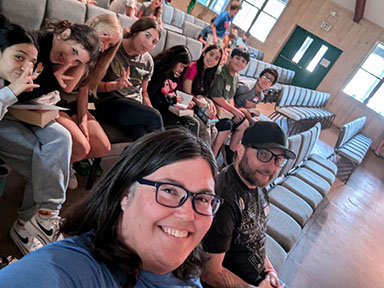
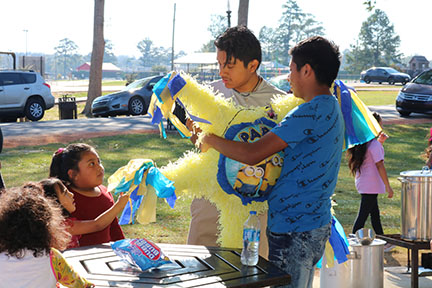

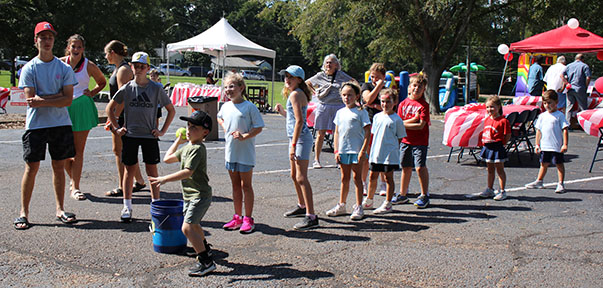
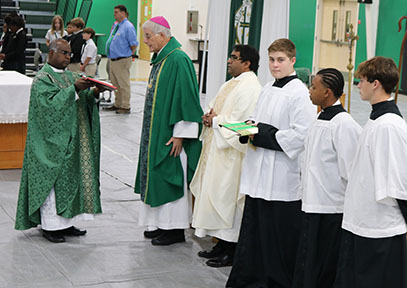
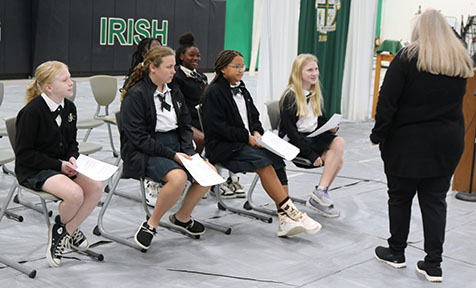
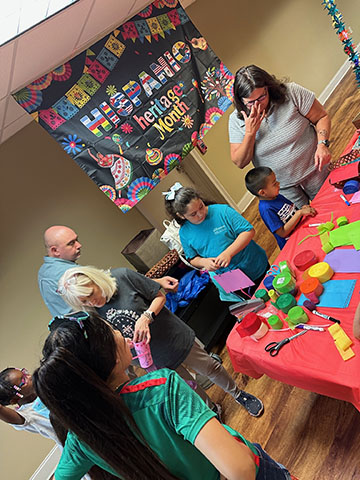
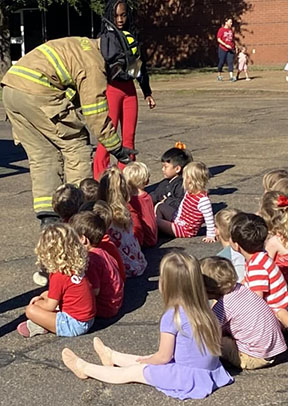
MADISON – St. Francis of Assisi Early Learning Center recently received a visit from the local Fire Department for a presentation on fire prevention. (Photo by Chelsea Scarbrough)